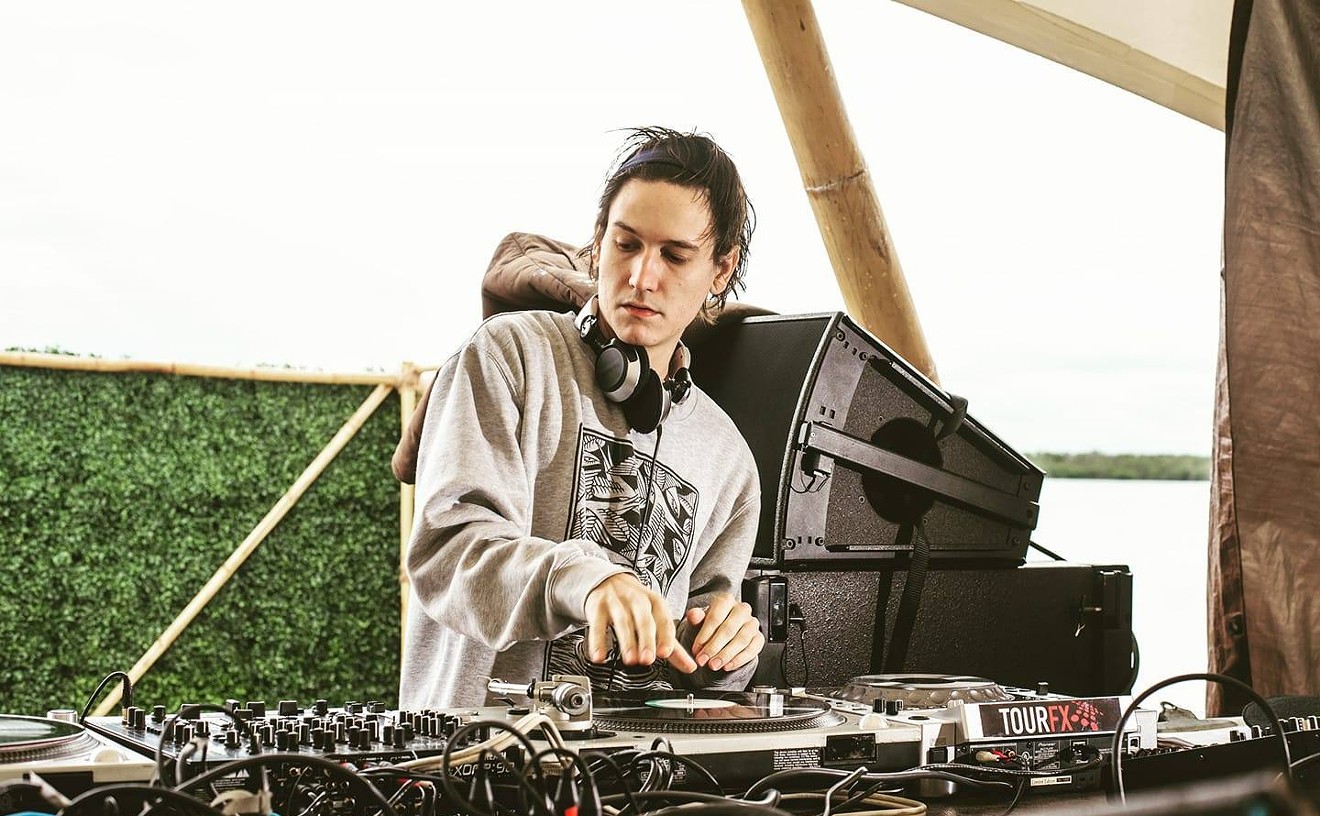Crosstown Rebels head honcho Damian Lazarus' Get Lost Miami party has been a perennially popular destination for Miami Music Week attendees for some time now. Stretching a full 24 hours and stacked to the brim with some of the most beloved acts in dance music, Get Lost Miami has more than earned its reputation as an event that needs to be seen to be believed, with its multicolored glass fixtures, blinding lasers, and all-around dedication to psychedelia. This year's edition was the most memorable yet, due in large part to its Lemon City Studios location. The Little Haiti venue, within spitting distance of Biscayne Boulevard, offers plenty of room for creatives to see their visions come to life. It helps that in addition to its indoor and outdoor offerings, Lemon City Studios hits that sweet spot between sun and shade that so often proves elusive in Miami.
Best Recording Studio
Circle House Studios
For nearly 40 years, Circle House Studios has provided recording artists with the quintessential Miami experience. Along with the requisite mixing consoles, mikes, and gear of a standard recording studio, Circle House offers artists a pool, palm trees, and a spacious outdoor patio, among other essentials. Given the accommodations, it's no surprise this facility has been in business for almost four decades. Founded by brothers Ian and Roger Lewis of the reggae band Inner Circle (best known for its 1987 hit and Cops theme song, "Bad Boys"), Circle House offers an ideal working space for artists to sit back, relax, and produce in a pressure-free environment. With the help of Ian's son Abebe, Circle House has originated countless hit productions, including Pharrell's "Happy" and The Miseducation of Lauryn Hill. The studio also hosts workshops to nourish young local artists, making it an accessible locale for the hitmakers of tomorrow.
- 13700 NW First Ave., Miami, 33168 Map
- 305-769-9700
Best Conviction
"Cocaine Cowboy" Gustavo Falcon
It is no secret that the majestic downtown Miami skyline and the precipitous economic growth it represents were at least partly funded by drug money. Throughout the 1980s, the Port of Miami and South Florida's shorelines were the gateway to a thriving narcotics industry made glamorous by Miami Vice and Scarface. Nothing better encapsulated the atmosphere of those Wild West days than Billy Corben's 2006 documentary, Cocaine Cowboys. Nearly all the players in the real-life true crime drama were arrested, with the exception of Gustavo Falcon. The 56-year old former drug runner evaded authorities for 26 years, living under an alias in Kissimmee, Florida. Falcon, better known as "Taby" to friends and associates, was part of a group responsible for smuggling 75 tons of cocaine into the United States, a haul valued at an estimated two billion dollars. According to the U.S. Attorney's Office, Falcon's role in the Miami crime enterprise involved some decidedly unsexy tasks, including collecting debts, keeping ledgers, and organizing transport. He was more accountant or office manager than gun-slinging drug lord, but he was nevertheless slapped down with an 11-year sentence in April, adding yet another chapter to Miami's wild crime history.
Best Unknown Band
AnastasiaMax

Anastasia and Max Brenner, 15 and 19 years old respectively, are making the most of their formative years channeling young adult angst into ominous orchestral pop. The duo recently dropped its debut EP, The Haunt, including the single "All Went Black," named one of the Best Miami Songs of 2017 by New Times. At a young age, Max's mature songwriting combines the eerie with the exuberant, and is buoyed by Anastasia's powerhouse vocals. In February, Anastasia, still in her early high school career, and Max, a first-year college student, volunteered their time to play a Revolution Live concert benefiting the victims of the Marjory Stoneman Douglas High School shooting.
Best Philanthropist
José Andrés
José Ramón Andrés Puerta is a two-star Michelin chef and the owner of over a dozen renowned restaurants, including the Bazaar on South Beach and Bazaar Mar in Brickell. More important, he and his nonprofit World Central Kitchen were the primary food source for the residents of Puerto Rico following Hurricane Maria. After serving more than 3.5 million meals, they single-handedly did more for the island nation of American citizens than many U.S. government agencies and officials combined. Earlier this year, Andrés was awarded the James Beard Humanitarian of the Year award for his efforts. The 48-year-old Spaniard founded World Central Kitchen in 2010 after witnessing the devastation wrought by earthquakes in Haiti that year. His organization has since been front and center in aiding people who need help quickly without bureaucratic delays. In addition to his international aid efforts, Andrés traveled to Washington, D.C., in March to feed the teenage protesters who participated in the March for Our Lives.
Best Villain
Derek Jeter
There is really only one way the negotiations between longtime Miami blight Jeffrey Loria and South Florida newcomer Derek Jeter could have concluded. Since taking over in October 2017, Jeter, former New York City single guy and baseball player with no managerial experience, shipped off the Miami Marlins' franchise man, Giancarlo Stanton, to Jeter's old ball club. In addition to getting rid of Stanton, the 2017 National League MVP, Jeter gutted the rest of the team, trading away Dee Gordon (MLB's stolen base leader in 2017) and Marcell Ozuna (who won both a Gold Glove and a Silver Slugger award for the first time last season). Since giving up a home run on the first pitch of the 2018 season, the Marlins have accrued the third-worst record in Major League Baseball. Jeter has also claimed that "Project Wolverine," the plan to slash payroll by $30 million, will allow the Marlins to turn a profit in a season with average spectator attendance 4,000 bodies fewer than the second-worst team in the league. Recently, in an interview on HBO's Real Sports, Bryant Gumbel asked Jeter point-blank if the team was tanking. Jeter responded that he didn't understand the term "tanking" and then proceeded to berate Gumbel, calling the venerable journalist "mentally weak."
Best Public Art
Peace & Love by R&R Studios
Over the last few years, "architects of hope" Roberto Behar and Rosario Marquardt have softened the hell of flying in and out of Miami International Airport. Travelers from near and far zip past the pair's work daily: the words "Peace & Love" sculpted of flower petals. The colorful welcome sign promises all will be well once flyers make it past the low ceilings, cranky TSA agents, and long queues. Behar and Marquardt are responsible for art installations throughout not only MIA, but Miami at large, crafting visually arresting works meant to instill a tranquil and reflective respite from the crushing chaos and noise of the bustling city. Behar and Marquardt's firm, R&R, was also behind the past Bésame Mucho installation at MIA, which greeted international arrivals stretching their legs after long security checks and even longer flights. Although R&R bears the initials of the founders' first names, in truth, those letters could stand for "rest and relaxation" — fleeting as they may be.
Best Dance Club
Treehouse

This year alone, Miami has lost popular clubs Ora and Heart. The local nightlife scene is quickly becoming an endangered species thanks to rising rents, gentrification, and nimby neighbors. It's disheartening, to say the least — Miami wouldn't be the city it is today without the nightlife institutions that have made it a place worth visiting. Treehouse seemed about to join the ghosts of nightclubs past when it announced in May 2017 it was "closing for the summer." In Clubland, "closing for the summer" or "closed for renovations" usually means "we're closing for good but are too embarrassed to admit it." Sure enough, summer came and went, and Treehouse didn't reopen for the busy tourist season. But then, weeks before this year's Miami Music Week, the club announced it would reopen with a full slate of parties. And while that could have been temporary, Treehouse has kept its door open, with local promoters Un_Mute booking shows every weekend.
- 323 23rd St., Miami Beach, 33140 Map
- 305-614-4478
- treehousemiami.com
Best DJ
Brother Dan

In just a few short years, 26-year-old Daniel Edenburg has carved out a niche for himself in Miami's fickle nightlife scene. In a city where EDM and house music reign supreme, Edenburg has become a soul and funk mixmaster. DJ'ing under the moniker Brother Dan, he blends left-field soul, funk, disco, electronic, and more to create a sound not typically heard on Miami's dance floors. Edenburg really shines at his Tuesday night Gramps shindig, Terrestrial Funk, which is also the name of his label and online and mobile record shop. As a label head, he's hoping to shine a light on obscure records. He recently pressed She's Hot With 2,000 Watts, an out-of-print release by Miami funk legend Lang Cook.
Best Electronic Act
Get Face

Tampa Bay native Skyler Schubert may have migrated south to attend Florida International University, but the 25-year-old seems to be getting most of his schooling from the city's nightlife these days. Schubert, better known as Get Face, has injected some much-needed experimentation into Miami's dance music scene. With his debut Space Tapes EP, 2018's Horns of a Beast, he veers close to the nonsensical while keeping it danceable. (The influence of other queer dance music acts like Arca and Sophie is evident.) And Get Face isn't done releasing music this year. He's working on a two-track EP for Adrianna "Gooddroid" Moschides' label Materia, and another release he's not yet ready to announce.





